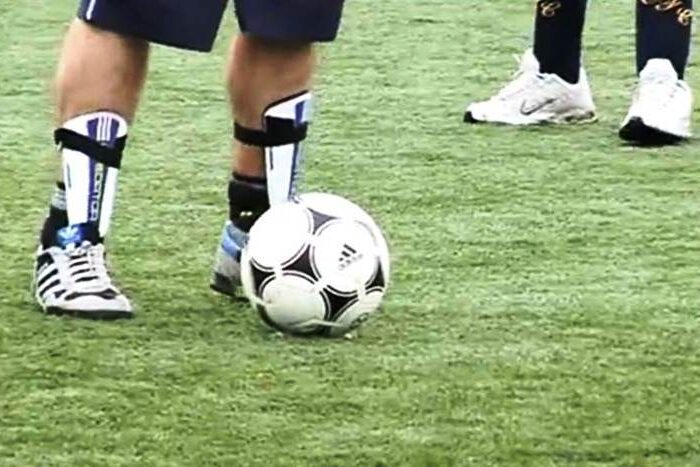
Grassroots football clubs are finding innovative ways to raise funds for survival throughout lockdown.
It is no secret that every football club in the country has faced some degree of financial strain during the trilogy of lockdowns. Although Premier League teams have the luxury of extravagant broadcast and sponsorship deals to survive these unprecedented times, there is a different, much harsher reality for teams lower down the ladder.
According to national statistics, there are over 40,000 clubs at grassroots level which substantially outnumbers those branded ‘elite’. Clubs ranging from junior level to semi professional are being faced with the task of coming up with ways of raising the necessary funds to maintain their status whilst their main source of income, spectators, is currently non-existent due to lockdown restrictions.
Semi-professional North West Counties league side, 1874 Northwich’s secretary Vicki English said:
“When you come to a club like ours it really is about family and community. Our fans and sponsors have always been very generous. We set up a membership scheme where people pay annual and monthly memberships and that does bring a good income in. We also have a lottery which has over 360 people paying in each week. Schemes like that are really helping to keep things going.
“Our sponsors have been very generous in still buying advertising boards at the ground even though the season has been very hit and miss. We’re not in any danger of folding, but we do see the difficulties for our friends in football. I expect when this ends we will see some clubs cease in existence which is so sad, something which I think those in authority don’t understand.”
The government has been forced to prioritise the health and wellbeing of the British public during the pandemic, however this has left grassroots football clubs feeling short of support. The Club Preparation Fund was launched in June by the FA, with the help of the Premier League, Sport England and the Football Foundation. This fund meant grants of £500 were enabled for over 4,000 grassroots clubs. For many others, this simply hasn’t been enough.
Semi-professional outfit Runcorn Town also play in the North West Counties league and, with other revenue sources cut off or limited, are grateful to have regular funding coming in through sponsorships.
Chairman Lindsay Berry said: “It’s not been too bad for us as we’ve had all the sponsorships in at the start of the season so we’re not having to pay match day revenues such as referees and what not, to be fair we’re not too bad.
“We’re not well off, don’t get me wrong, but not struggling like a few clubs are.”
“It’s down to the hard work of the people behind the scenes, on the committee and everyone in the local community who invests into the club who don’t want to see grassroots football die.”
Runcorn Sports of the MSC Express West Cheshire League have been forced into finding new ways of fundraising – as their usual methods have been halted.
Club chairman, Daniel Bellfield said: “The covid pandemic itself has meant that the normal way of raising funds through subs, selling football cards in local pubs, match days and race nights are out of reach, something we just can’t do at the moment.
“How we’ve got around that, it’s been a difficult time, but we’ve got great people around the club and we’ve been able to change the way we generate funds and develop the club.”
Runcorn Sports have turned to social media to connect with supporters to adapt to the current climate. Mr Bellfield said: “The way we do this is through selling football scratch cards online in WhatsApp groups and on Facebook. Without Facebook, Twitter, and Instagram we wouldn’t have been able to raise anywhere near as much as we have done.
“We utilise some of our sponsorship deals to raffle signed merchandise which has been a massive help. We also have a four-ball lottery. It has been a massive help for us as we are also able to re-invest into local causes and give back to local charities.
“It’s down to the hard work of the people behind the scenes, on the committee and everyone in the local community who invests into the club who don’t want to see grassroots football die.”
Grassroots and lower league football was an area short of funding and support before a covid world, therefore the impact of the pandemic has left many sides with little room for manoeuvre when it comes to boosting finances. Since the beginning of the first lockdown, the average income of children’s grassroots clubs in the UK fell by around 46 percent. And more than one in 10 clubs have experienced a fall in income of at least 95 percent.
Despite this Brendan Stewart, secretary for Beechwood Junior Football Club in Runcorn said that the junior set up hasn’t been too badly affected financially due to lack of expenditure but accepts things may get tough when the proposed new season begins in the summer.
“We’re not having any out-goings because we haven’t been playing so it hasn’t really had a massive effect on us,” he said.
“I think it may do when we start properly again when things need to be paid for. It may have an affect as we obviously would usually build our subs up throughout the year.”
It’s a tough time for teams everywhere, but many clubs no matter what their level hold community spirit at the heart of what they do. Local generosity and togetherness seem to be a pivotal part of keeping the lower leagues alive, something which can certainly act as a source of positivity and encouragement that these clubs can be back playing again and doing what they do best as soon as it is safe to do so.

